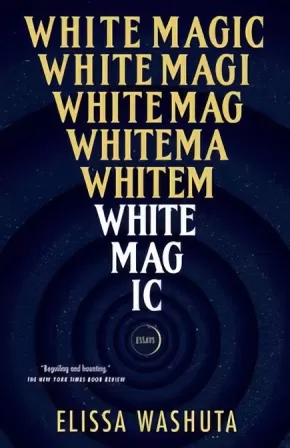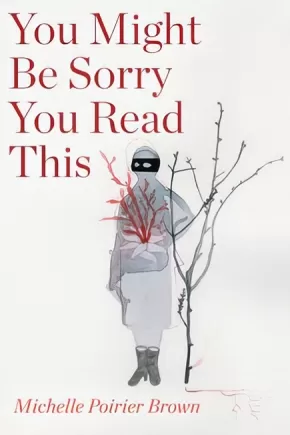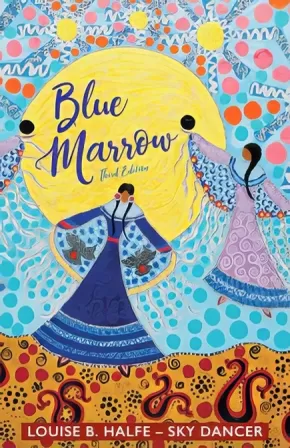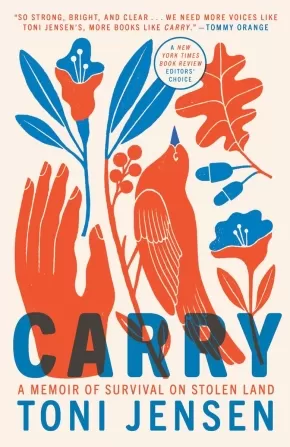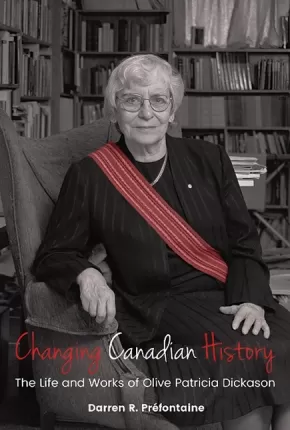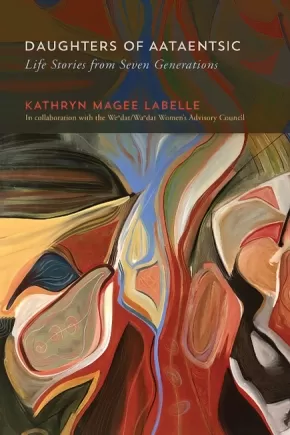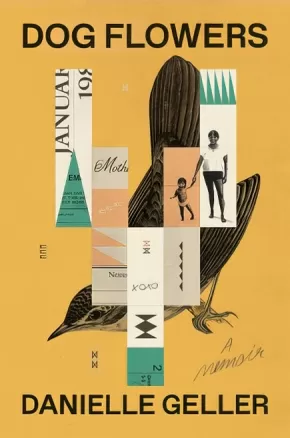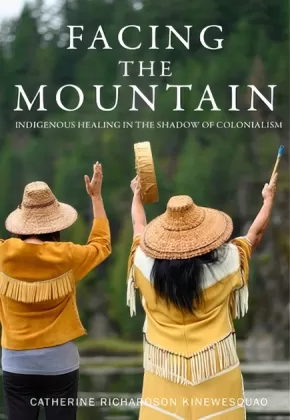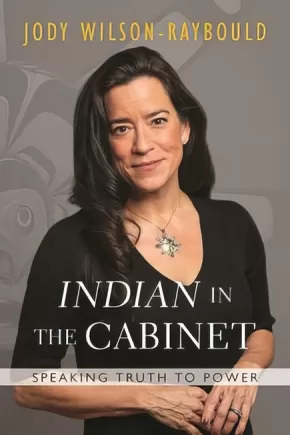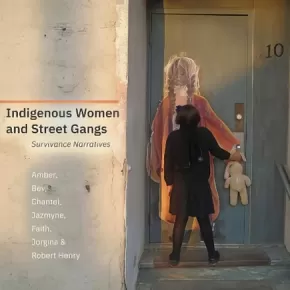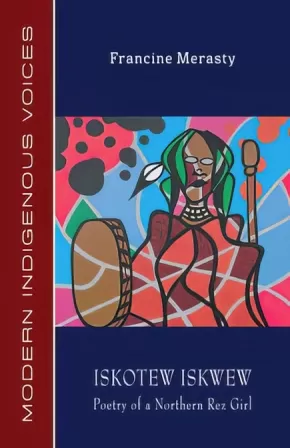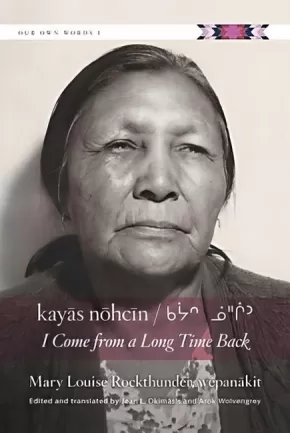Women's Studies
Synopsis:
The Big Melt is a debut poetry collection rooted in nehiyaw thought and urban millennial life events. It examines what it means to repair kinship, contend with fraught history, go home and contemplate prairie ndn utopia in the era of late capitalism and climate change. Part memoir, part research project, this collection draws on Riddle’s experience working in Indigenous governance and her affection for confessional poetry in crafting feminist works that are firmly rooted in place. This book refuses a linear understanding of time in its focus on women in the author’s family, some who have passed and others who are yet to come. The Big Melt is about inheriting a Treaty relationship just as much as it is about breakups, demonstrating that governance is just as much about our interpersonal relationships as it is law and policy. How does one live one’s life in a way that honours inherited responsibilities, a deep love for humour and a commitment to always learning about the tension between a culture that deeply values collectivity and the autonomy of the individual? Perhaps we find these answers in the examination of ourselves, the lands we are from and the relationships we hold.
Awards
- 2023 Indigenous Voices Awards Co-Winner for Published Poetry in English
Reviews
"Gentle, firm and funny, Emily Riddle uses The Big Melt to Aunty us all. This radically personal debut, like an iceberg or crater on the moon, reaches deep down into history—political, familial, environmental, romantical—to make sense of what it means to be an ndn on the prairies today who understands that the Oilers and West Edmonton Mall and miniskirts are sacred, and that this “bootlegging operation called Canada” can’t stop telling lies. There are truths here for us; the immense research behind the text feels like a lifetime labour of love, done out of necessity to reconcile loss and fashion some comfort in the face of colonial violence. What a gift it is for Riddle to show us, with clarity and wit, how fierce friendship and unshakeable matriarchs have helped her to connect with her ancestors, nehiyaw askiy, and herself." — Molly Cross-Blanchard, August 2022
Additional Information
112 pages | 5.50" x 8.00" | Paperback
Synopsis:
A “kunik” is a traditional Inuit greeting, often given to loved ones, in which a person places their nose on another’s cheek and breathes them in. Where the Sea Kuniks the Land extends that gesture of love to the Arctic landscape, in a suite of poems that celebrates the interconnectedness of people and place, past and present.
The importance of land, culture, and identity play key roles in these poems, and the collection will move readers to think deeply about colonization, intergenerational trauma, and grief.
This collection paints beautiful pictures of Arctic landscapes, love stories, and growth. It will take readers on a journey through the seasons, from fierce snowstorms to a warm field of Labrador tea flowers.
Additional Information
80 pages | 7.00" x 9.25" | Paperback
Synopsis:
Throughout her life, Elissa Washuta has been surrounded by cheap facsimiles of Native spiritual tools and occult trends, “starter witch kits” of sage, rose quartz, and tarot cards packaged together in paper and plastic. Following a decade of abuse, addiction, PTSD, and heavy-duty drug treatment for a misdiagnosis of bipolar disorder, she felt drawn to the real spirits and powers her dispossessed and discarded ancestors knew, while she undertook necessary work to find love and meaning.
In this collection of intertwined essays, she writes about land, heartbreak, and colonization, about life without the escape hatch of intoxication, and about how she became a powerful witch. She interlaces stories from her forebears with cultural artifacts from her own life—Twin Peaks, the Oregon Trail II video game, a Claymation Satan, a YouTube video of Stevie Nicks and Lindsey Buckingham—to explore questions of cultural inheritance and the particular danger, as a Native woman, of relaxing into romantic love under colonial rule.
Reviews
"A fascinating magic trick of a memoir that illuminates a woman's search for meaning." —Kirkus, Starred Review
"Washuta’s frank confrontations with, and acknowledgments of, unhealed wounds are validating. . . . evoking the sense of peeling open a letter from an estranged friend. A poignant work by a rising essayist."—Foreword Reviews, Starred Review
"Her prose is crisp and precise, and the references hit spot-on. . . . Fans of the personal essay are in for a treat."—Publishers Weekly
"Powerful. . . . Washuta’s essays refuse the mandate of a tidy resolution. Instead she circles around each subject, inspecting it as symbol, myth, metaphor, and reality, all while allowing her readers space to draw their own conclusions, or to reject the need for any conclusion at all. Like a stage magician, she asks readers to look again. White Magic is an insightful, surprising, and eloquent record of stories of magic and the magic in stories." —Booklist
"Washuta's story and struggles become a metaphor for the toll of colonialism on generations of Indigenous people like herself. Readers of recovery narratives, women's issues, and keenly observed social commentary will be rewarded here."—Library Journal
"White magic, red magic, Stevie Nicks magic—this is Elissa Washuta magic, which is a spell carved from a life, written in blood, and sealed in an honesty I can hardly fathom." —Stephen Graham Jones, author of The Only Good Indians
"White Magic is funny and wry, it’s thought-provoking and tender. It’s a sleight of hand performed by a true master of the craft. White Magic is magnificent and Elissa Washuta is spellbinding. There is no one else like her." —Kristen Arnett, author of Mostly Dead Things
"These pages are windows into a black lodge where Twin Peaks and Fleetwood Mac are on repeat—sometimes forward, sometimes backwards, sometimes in blackout blur. I stand in awe of everything here. What an incredible and wounding read."—Richard van Camp, author of The Lesser Blessed
Additional Information
Paperback
Synopsis:
You Might Be Sorry You Read This is a stunning debut, revealing how breaking silences and reconciling identity can refine anger into something both useful and beautiful. A poetic memoir that looks unflinchingly at childhood trauma (both incestuous rape and surviving exposure in extreme cold), it also tells the story of coming to terms with a hidden Indigenous identity when the poet discovered her Métis heritage at age 38. This collection is a journey of pain, belonging, hope, and resilience. The confessional poems are polished yet unpretentious, often edgy but humorous; they explore trauma yet prioritize the poet’s story. Honouring the complexities of Indigenous identity and the raw experiences of womanhood, mental illness, and queer selfhood, these narratives carry weight. They tell us “You need / only be the simple / expression of the divine / intent / that is your life.” There is a lifetime in these poems.
Reviews
"Michelle Poirier Brown’s first collection of poetry is accomplished and gripping. In her five-decade story, perceptions, denial, emotional embroilments and poignant tenderness are peeled back and examined. As the narrative builds, we encounter the sheer alchemical power of poetry. This is rare. You Might Be Sorry You Read This will change you." — Betsy Warland, Bloodroot—Tracing the Untelling of Motherloss
“One of the functions of poetry is to make you uncomfortable.” This epigraph, by Pádraig Ó Tuama, begins Michelle Poirier Brown’s debut collection—a collection that intends, unapologetically, to discomfort the reader. With unflinching precision and the exactness of a fine poet’s eye, Poirier Brown challenges her readers to encounter not only her childhood trauma but, ultimately, the power of her self—her late-discovered Métis identity, her navigation of PTSD, her unwillingness to settle for less than the truth. In the final poem, “Self-Portrait of the Poet,” she concludes, “go ahead. look. / Look as long as you like.” Invitation or command, it’s a hard look Poirier Brown offers. It may make readers uncomfortable. But they won’t be sorry.” —Laura Apol, author of A Fine Yellow Dust
Educator Information
Keywords / Themes: Identity, Trauma, Pain, Resilience, Family, Métis, Indigenous.
Table of Contents
1 The Father I Had
3 God Was a Baby
4 A Child’s Book of Holy Services
6 Her Breath on My Face
8 Other Side of the Glass
10 Effect on Her Throat
11 The House on Strathnaver Avenue
15 Mothers Who Know
16 The Thing About Snow
22 Photograph
23 Under the Covers
25 The Girls I Grew Up With Are Everywhere
27 Short Change
28 After the Test
29 Walk on the Left-Hand Side
30 5:53 PM
32 A Perspective on Women
33 Collard Greens
34 Lasts
36 I’m Allowed to Have Whatever Kind of Father I Want
38 Intimacy
39 On the Porch
41 At Times, My Teeth Chatter
about face
46 What It’s Like to Have My Face
47 Understanding My Face
52 Wake
54 A Fragile Defiance
55 Smoke
57 Winnipeg Trip
59 Commitment
61 Two Mornings, 2018
63 Boxed
64 Those I Call Friends
66 Duck Ugly
67 Beneficiaries of a Genocide
69 Slow
70 Sometimes You Learn Things Quite Late in the Game
72 Something Purple
75 what it is like to be this extreme and appear normal
78 The Other Grandmother
80 Self-Portrait of the Poet
83 addendum
87 poetic statement
90 acknowledgements
Additional Information
104 pages | 6.00" x 9.00" | Paperback
Synopsis:
The voices of Blue Marrow sing out from the past and the present. They are the voices of the Grandmothers, both personal and legendary. They share their wisdom, their lives, their dreams. They proclaim the injustice of colonialism, the violence of proselytism, and the horrors of the residential school system with an honesty that cuts to the marrow. Speaking in both English and Cree, these are voices of hopefulness, strength, and survivance. Blue Marrow is a tribute to the indomitable power of Indigenous women of the past and of the present day.
Educator Information
This is the 3rd Edition of this book. More than twenty years since its first publication, this critically acclaimed collection is available in a redesigned edition, including an all-new interview with its celebrated author, Louise B. Halfe - Sky Dancer.
Some of the text is written in Cree.
Additional Information
120 pages | 5.50" x 8.50" | paperback | 8 illustrations
Synopsis:
Toni Jensen grew up around guns: As a girl, she learned to shoot birds in rural Iowa with her father, a card-carrying member of the NRA. As an adult, she’s had guns waved in her face near Standing Rock, and felt their silent threat on the concealed-carry campus where she teaches. And she has always known that in this she is not alone. As a Métis woman, she is no stranger to the violence enacted on the bodies of Indigenous women, on Indigenous land, and the ways it is hidden, ignored, forgotten.
In Carry, Jensen maps her personal experience onto the historical, exploring how history is lived in the body and redefining the language we use to speak about violence in America. In the title chapter, Jensen connects the trauma of school shootings with her own experiences of racism and sexual assault on college campuses. “The Worry Line” explores the gun and gang violence in her neighborhood the year her daughter was born. “At the Workshop” focuses on her graduate school years, during which a workshop classmate repeatedly killed off thinly veiled versions of her in his stories. In “Women in the Fracklands,” Jensen takes the reader inside Standing Rock during the Dakota Access Pipeline protests and bears witness to the peril faced by women in regions overcome by the fracking boom.
In prose at once forensic and deeply emotional, Toni Jensen shows herself to be a brave new voice and a fearless witness to her own difficult history—as well as to the violent cultural landscape in which she finds her coordinates. With each chapter, Carry reminds us that surviving in one’s country is not the same as surviving one’s country.
Reviews
“Like a murmuration of starlings, Toni Jensen’s new book Carry changes its shape constantly and effortlessly. . . . The value of Carry lies in its unique structure, its sparse, powerful prose, and in the stinging perspective it provides on events that are numbingly common. Until we see it as clearly as Jensen does, the lens she offers on gun violence in America will be relevant again and again and again.”—Chicago Review of Books
“In Carry, Jensen scours language to find a new way of writing about how historical injustices seep into the present. . . . With a controlled voice like a Philip Glass composition, smooth, meandering yet repetitive, Jensen considers her troubled past and begins the work of stitching herself back together. . . . An unsettling account that creeps into your bones.”—The New York Times Book Review
“Toni Jensen grew up around guns. But bird-hunting with her father was a much different experience than staring down bored barrels at Standing Rock. A new and much-needed voice, Métis author Jensen shares her deepest thoughts and most emotional experiences in Carry.”—Bustle
“Toni Jensen’s memoir is stunning. There’s no other words that come to mind—it’s about growing up Métis, existing as an Indigenous woman in America, and the looming threat of ever-pervasive gun violence. . . . A must-read.”—Alma (Alma’s Favorite Books for Fall 2020)
“Moving between personal recollections and historical observations, Jensen narrates what it means to be Métis, and what it feels like to be connected by bodies and land. . . . A meditative exploration of people and place that shows what it means to live and survive.”—Library Journal
“[A] debut memoir from a Native author enmeshed in the American way of violence, alienation, and death . . . a powerful rejection of a culture that has always been grounded in violence and intimidation.”—Kirkus Reviews
“Carry explores the gun’s tragic impact with heartfelt prose and deep intellect—on politics, on history, on Black and Indigenous bodies, on women’s bodies, and on children behind closed doors . . . It is full of difficult and vital news, delivered right on time.”—Terese Marie Mailhot, New York Times bestselling author of Heart Berries
Additional Information
304 pages | 5.24" x 7.94" | Paperback
Synopsis:
For six decades, Olive Dickason was a remarkable contributor to Canadian public life. An award-winning journalist, influential academic, and respected human rights advocate, her life was a triumph over seemingly impossible obstacles. These many impediments include having a childhood marked by poverty; being forced, as a single working mother, to place her three daughters in foster care for several years; working as a female journalist in the sexist, “Mad Men” era of the 1950s and ‘60s; giving up a successful journalism career to obtain a doctorate in Indigenous history; arguing successfully with the university establishment on whether or not Indigenous peoples had history; and taking her fight against mandatory retirement all the way to the Supreme Court. Olive Dickason faced these challenges with determination and dignity and was an inspiration for all who knew her. Changing Canadian History: The Life and Works of Olive Patricia Dickason is the first full-length biography of this trailblazing icon who forever changed how Indigenous history is viewed in Canada.
Reviews
“Olive Dickason pushed the boundaries of sexism, racism, and ageism, defying colonial narratives upheld by patriarchal systems.”—Dr. Cindy Gaudet, Campus Saint-Jean, University of Alberta
“A biography of a brilliant woman who forged entry into Canadian cultural and intellectual institutions by sheer force of determination.”—Dr. Allyson Stevenson, Gabriel Dumont Institute Chair, Métis Studies
Educator Information
This book is the first biography of this trailblazing icon who forever changed how Indigenous history is viewed in Turtle Island and beyond. Based on years of meticulous research, this work provides readers with an engaging and thought-provoking read about this iconic academic who helped define a discipline.
Additional Information
445 Pages
Synopsis:
Daughters of Aataentsic highlights and connects the unique lives of seven Wendat/Wandat women whose legacies are still felt today. Spanning the continent and the colonial borders of New France, British North America, Canada, and the United States, this book shows how Wendat people and place came together in Ontario, Quebec, Michigan, Ohio, Kansas, and Oklahoma, and how generations of activism became intimately tied with notions of family, community, motherwork, and legacy from the seventeenth to the twenty-first century. The lives of the seven women tell a story of individual and community triumph despite difficulties and great loss. Kathryn Magee Labelle aims to decolonize the historical discipline by researching with Indigenous people rather than researching on them. It is a collaborative effort, guided by an advisory council of eight Wendat/Wandat women, reflecting the needs and desires of community members. Daughters of Aataentsic challenges colonial interpretations by demonstrating the centrality of women, past and present, to Wendat/Wandat culture and history. Labelle draws from institutional archives and published works, as well as from oral histories and private collections. Breaking new ground in both historical narratives and community-guided research in North America, Daughters of Aataentsic offers an alternative narrative by considering the ways in which individual Wendat/Wandat women resisted colonialism, preserved their culture, and acted as matriarchs.
Reviews
"Daughters of Aataentsic makes a significant contribution to the historiography of Indigenous women. Labelle has written an important book and her laudatory and exemplary methodology is a model for all people researching and writing on First Nations and Native Americans." — Clifford Trafzer, University of California, Riverside
"Daughters of Aataentsic enriches our understanding of the everyday lives of real women, their families, and communities across time in Quebec and parts of the southwestern and western United States. This book does not denounce the past, holler, and shout, but rather attends to the range of information and knowledge passed down to draw us into times and places we would otherwise not have the privilege of knowing from an Indigenous perspective. Its insights have stuck with me long after my first reading, as I expect they will for others." — Jean Barman, University of British Columbia
Educator Information
Table of Contents
Acknowledgments xiii
Figures xv
Map xxvi
Introduction 3
1 Cécile Gannendâris (?-1669) 13
2 Marie Catherine Jean dit Vien (1676-1767) 33
3 Margaret Grey Eyes Solomon (1816-1890) 50
4 Mary McKee (1838-1922) 69
5 Eliza Burton Conley Jr (1869-1946) 90
6 Jane Zane Gordon (1871-1963) 115
7 Dr Éléonore Sioui (1924-2006) 132
Epilogue: The Wendat/Wandat Women’s Advisory Council 154
Notes 169
Index 205
Recommended for these subjects: History, Women's History, North American History, Canadian History, Indigenous History, Indigenous Studies, Women's and Gender Studies.
Additional Information
240 pages | 6.00" x 9.00" | 21 Photos, 7 Diagrams
Synopsis:
A daughter returns home to the Navajo reservation to retrace her mother’s life in a memoir that is both a narrative and an archive of one family’s troubled history.
When Danielle Geller’s mother dies of alcohol withdrawal during an attempt to get sober, Geller returns to Florida and finds her mother’s life packed into eight suitcases. Most were filled with clothes, except for the last one, which contained diaries, photos, and letters, a few undeveloped disposable cameras, dried sage, jewelry, and the bandana her mother wore on days she skipped a hair wash.
Geller, an archivist and a writer, uses these pieces of her mother’s life to try and understand her mother’s relationship to home, and their shared need to leave it. Geller embarks on a journey where she confronts her family's history and the decisions that she herself had been forced to make while growing up, a journey that will end at her mother's home: the Navajo reservation.
Dog Flowers is an arresting, photo-lingual memoir that masterfully weaves together images and text to examine mothers and mothering, sisters and caretaking, and colonized bodies. Exploring loss and inheritance, beauty and balance, Danielle Geller pays homage to our pasts, traditions, and heritage, to the families we are given and the families we choose.
Reviews
“Dog Flowers by Danielle Geller is a journey story we’ve never read before. Geller travels through snippets of her own life and that of her mother’s, creating a narrative where all roads lead to her mother’s home in the Navajo Nation. It’s an honest, intimate, and heart-wrenching memoir that explores fractured family, the damaging effects of alcoholism and poverty, and what it means to seek healing from legacies of trauma. This book gave me chills. Trained as a librarian and archivist, Geller has created a type of archive, a living collection of memories and documents that speak to a life that is at once precisely individualistic while also being universally resonant. Read this book.”—Kali Fajardo-Anstine, author of Sabrina & Corina
“Dog Flowers pulls the few remaining threads of an unraveled family life. This courageous, honest, desperate, tender, and compelling book tells a daughter’s story of her troubled mother. In Dog Flowers, we learn that a handful of threads can never reweave the blanket of family, or patch up what a mother’s abandonment has torn. What little we learn of Geller’s Navajo mother comes from collaged notes and journal entries, photographs and reportage; it’s a story full of gaps. Which is exactly what’s remarkable about this book: Geller does not seek to make anything whole but herself. She refuses to deal in the tropes of redemption and reconciliation—which just shows how much strength it takes not to judge another’s life or lie about it. Even her return to her mother’s Navajo Nation does not bring about an easy cultural reunion, although it does give us a satisfying sense that while an immediate family can fall apart, an extended family, a tribe, ties a tight web that might just hold.”—Heid E. Erdrich, award-winning poet, author, and editor of the award-winning New Poets of Native Nations
“A Navajo woman’s memoir of family, loss, and self-discovery. [Danielle Geller] takes readers on two parallel journeys: that of her mother, Laureen, who left the Navajo reservation at age nineteen, “almost as soon as she could,” and her own, which begins with her notifying her sister Eileen that their mother was dying. . . . After Laureen’s death, Geller collected her mother’s belongings, “packed into eight suitcases” and including “her diaries, her photos, and the letters she kept.” Using these personal items, the author expertly weaves her story into Laureen’s. . . . Geller’s mix of archival research and personal memoir allows readers to see a refreshing variety of perspectives and layers, resulting in an eye-opening, moving narrative. A deftly rendered, powerful story of family, grief, and the search for self.”—Kirkus Reviews
Additional Information
272 pages | 6.12" x 9.25" | 27 black & white photos | Hardcover
Synopsis:
Nowhere in the texts on counselling, recovery, or lifespan development does it make links between well-being and not having your land stolen. When an entire people are generally portrayed as mentally ill, because that is, of course, what it means to have a diagnosis of clinical depression, anxiety, or post-traumatic stress disorder, it is easy for the State to view these people as unfit to manage their lives. Then, all sorts of functions are performed on Indigenous families that are tantamount to victim-blaming formulations that, in the end, deny opportunities associated with full citizenship.
The author goes beyond offering social analysis, and possible pathways toward healing, and shares her own experience as an Indigenous woman with Metis, Cree and Gwichin heritage. She talks about her approach to a second cancer diagnosis, and explores the way she characterized her experience of chemotherapy and radiation in a way that cast the journey as personal and heroic, rather than merely medical and out of her control.
One of the main contributions of this book is a discussion of how mainstream counselling and the helping professions have overlooked important facts about oppression, including the reminder from Gloria Steinem that the personal is political.
Additional Information
135 Pages | 6” x 9” | Paperback
Synopsis:
For 34 years, Lynn Gehl fought against the sex discrimination built into Canada’s Indian Act. This is the story of her challenges and eventual success.
A follow-up to Claiming Anishinaabe, Gehl v Canada is the story of Lynn Gehl’s lifelong journey of survival against the nation-state’s constant genocidal assault against her existence. While Canada set up its colonial powers—including the Supreme Court, House of Commons, Senate Chamber, and the Residences of the Prime Minister and Governor General—on her traditional Algonquin territory, usurping the riches and resources of the land, she was pushed to the margins, exiled to a life of poverty in Toronto’s inner-city.
With only beads in her pocket, Gehl spent her entire life fighting back, and now offers an insider analysis of Indian Act litigation, the narrow remedies the court imposes, and of obfuscating parliamentary discourse, as well as an important critique of the methodology of legal positivism. Drawing on social identity and Indigenous theories, the author presents Disenfranchised Spirit Theory, revealing insights into the identity struggles facing Indigenous Peoples to this day.
Reviews
“Congratulations . . . to Dr. Lynn Gehl for her successful challenge of the Indian Registrar’s refusal to allow her to be registered under the Indian Act. . . . Good win, Lynn!”—The Honourable Murray Sinclair
“With knowledge and experience from years of advocacy before Parliament as well as the courts, and the depth of perception typical of all her scholarly work, Dr. Gehl assesses what more is needed before the Indian Act system can be truly egalitarian. Her book is unique and inspiring.” —Mary Eberts, from the foreword
“[R]emarkable . . . a monument in Indigenous struggles with the colonial Crown.” —Veldon Coburn, Institute of Indigenous Research and Studies at University of Ottawa
“Gehl embodies essential Indigenous wisdom, bravery, and responsibility in her work to dismantle the systems of colonial oppression. Her work serves as a beacon in a network of pathways for our people to make their way home.” —Chief Wendy Jocko, Algonquins of Pikwàkanagàn First Nation
“The legal decision in Gehl v Canada will have profound effects for the future, ensuring that hundreds of thousands of Indigenous mothers will be able to pass their status on to their children. This victory, the product of decades of struggle by Lynn Gehl, is chronicled here. Read it and learn!” —Bonita Lawrence, author of Fractured Homeland
Educator Information
This is the follow-up to Claiming Anishinaabe.
Centres Anishinaabe methods of personal truth over western academia.
Introduces readers to the paternity policy of the Indian Art, explaining how this policy was sexual discrimination and bloodless genocide. The paternity policy of the Indian Act required individuals claiming Status to demonstrate the lineage of both parents. Harmful to Indigenous mothers and children, and imposing a high evidentiary burden on Indigenous people claiming Status, it was overturned on April 20, 2017, in what is now known as the Gehl decision.
Additional Information
288 pages | 6.00" x 9.00" | Paperback
Synopsis:
A compelling political memoir of leadership and speaking truth to power by one of the most inspiring women of her generation.
Jody Wilson-Raybould was raised to be a leader. Inspired by the example of her grandmother, who persevered throughout her life to keep alive the governing traditions of her people, and raised as the daughter of a hereditary chief and Indigenous leader, Wilson-Raybould always knew she would take on leadership roles and responsibilities. She never anticipated, however, that those roles would lead to a journey from her home community of We Wai Kai in British Columbia to Ottawa as Canada’s first Indigenous Minister of Justice and Attorney General in the Cabinet of then newly elected prime minister, Justin Trudeau.
Wilson-Raybould’s experience in Trudeau’s Cabinet reveals important lessons about how we must continue to strengthen our political institutions and culture, and the changes we must make to meet challenges such as racial justice and climate change. As her initial optimism about the possibilities of enacting change while in Cabinet shifted to struggles over inclusivity, deficiencies of political will, and concerns about adherence to core principles of our democracy, Wilson-Raybould stood on principle and, ultimately, resigned. In standing her personal and professional ground and telling the truth in front of the nation, Wilson-Raybould demonstrated the need for greater independence and less partisanship in how we govern.
"Indian” in the Cabinet: Speaking Truth to Power is the story of why Wilson-Raybould got into federal politics, her experience as an Indigenous leader sitting around the Cabinet table, her proudest achievements, the very public SNC-Lavalin affair, and how she got out and moved forward. Now sitting as an Independent Member in Parliament, Wilson-Raybould believes there is a better way to govern and a better way for politics—one that will make a better country for all.
Additional Information
352 pages | 6.00" x 9.00" | Hardcover
Synopsis:
Amber, Bev, Chantel, Jazmyne, Faith, and Jorgina are six Indigenous women previously involved in street gangs or street lifestyles. In Indigenous Women and Street Gangs they collaborate with Robert Henry (Métis) to share an emancipatory expression of their lives through photovoice. Each author shares a narrative that begins with her earliest memory and continues to the present. This is followed by a selection of photographs the woman took to show how she has changed with her experiences. Readers can expect difficult life stories imbued with hope and humour. Throughout, these women show us the meaning of survivance; a process of survival, resistance, resurgence, and growth.
“I don’t think there is any such thing as bad; it’s called healing, you know? It is starting to fix yourself inside your heart, you know? You just got to keep doing it, that’s all I got to say.”- Jazmyne
Educator Information
Caution: mature, triggering, explicit content.
Keywords / Subjects: survivance; photovoice; Indigenous; street gang; critical gang studies; Saskatchewan; women; oral history; community engaged research; relational practice; justice; child welfare; education; health; social work; social services; criminology
Table of Contents
ix Acknowledgements
xi Introduction
3 Amber
23 Bev
39 Chantel
59 Jazmyne
77 Faith
95 Jorgina
115 Photograph Captions
123 Bibliography
Additional Information
144 pages | 9.00" x 9.00" | Paperback
Synopsis:
Iskotew Iskwew/Fire Woman is a poetry collection written during a period of trauma while the author was working as a Counsel to the National Inquiry into Missing and Murdered Indigenous Women and Girls in 2017. This book is about memories and experiences growing up on the Pelican Narrows Reserve in northern Saskatchewan in the 1980s: summers spent on the land and the pain of residential school. With this collection, the author wants to teach and inform Canadians of her experiences growing up as an Indigenous woman in Saskatchewan. She believes it is important to share her stories for others to read.
Additional Information
104 pages | 5.50" x 8.50"
Synopsis:
A collection of narratives as told in the nêhiyawêwin (Cree) language by Elder Mary Louise Rockthunder, spanning her rich life and extensive knowledge of her traditions and culture.
Mary Louise (née Bangs) Rockthunder, wêpanâkit, was an Elder of Cree, Saulteaux, and Nakoda descent. Born in 1913, raised and married at nēhiyawipwātināhk / Piapot First Nation, Mary Louise, a much-loved storyteller, speaks of her memories, stories, and knowledge, revealing her personal humility and her deep love and respect for her family and her nêhiyawêwin language and culture.
The recordings that are transcribed, edited, and translated for this book are presented in three forms: Cree syllabics, standard roman orthography (SRO) for Cree, and English. A full Cree-English glossary concludes the book, providing an additional resource for those learning the nêhiyawêwin language.
Educator & Series Information
This book is part of the Our Own Words series. Our Own Words is a new Indigenous language series that seeks to present longer, more extensive Indigenous texts for both intermediate and advanced learners of the language.
Additional Information
264 pages | 6.00" x 9.00" | Translated by Jean L. Okimasis and Arok Wolvengrey | Paperback





